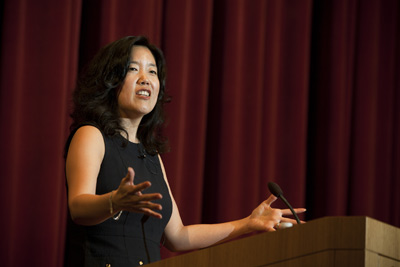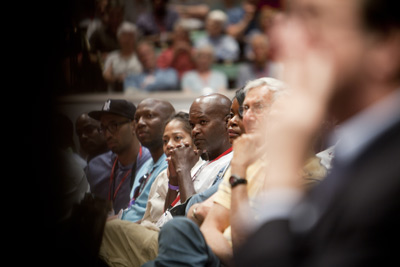Michelle Rhee: Public education is about kids, not adults
By Anne Ju


Michelle Rhee '92 took her no-nonsense message of public education reform and accountability to Cornell's campus as the Spencer T. and Ann W. Olin lecturer, June 8, during Reunion Weekend.
The former chancellor of the Washington, D.C., public schools and current CEO of the nonprofit StudentsFirst, Rhee told alumni and friends packed into Bailey Hall that public education is a badly broken system married to special interests that does not serve the needs of children as it should.
"I believe that public education is supposed to be the great equalizer in our country," Rhee said. "It is supposed to be the thing that ensures that it doesn't matter if you are black or white, rich or poor -- we have public schools so that every single child can have an equal shot in life. That is not the reality for the children in America today."
Appointed to head the D.C. public schools by then-mayor Adrian Fenty in 2007, Rhee inherited a dismally dysfunctional system in which only 9 percent of ninth graders were likely to graduate college, and only 8 percent of eighth graders were performing on grade level in math. This was despite the District of Columbia spending more money per child than almost any other school jurisdiction in the nation, she said.
Her shakeup of the system (a subject of the documentary "Waiting for Superman") involved firing employees and attempting to rein in wastefulness and incompetence. One "memorable" day she recalled: A 14-hour public hearing at the District of Columbia city council after legislation was introduced that would make public school central office employees "at-will" employees, meaning they could be terminated at the will of the supervisor.
"That was firestorm No. 1 in Washington, D.C.," she said. She noted that "all the arguments were about adult issues and job security and due process" -- nothing about children or schools.
Rhee's efforts led to some successes in student achievement, she said, but her tenure was cut short in 2010 when Fenty was not re-elected.
She shared three principles for education reform today, which she believes to be at a seminal and crucial moment. First, society must begin to respect and honor teachers, who she believes can make a world of difference, for better or worse, in children's lives.
Second, America must regain its competitive spirit. "We've gone totally soft as a country," she said. Rather than having them coddled and their mediocrity celebrated, children would be better served by being shown "what excellence looks like," she said.
And lastly, Rhee urged people to stop thinking about everything along party lines. She shared how she, a lifelong Democrat, initially toed the party line around the issue of school vouchers, but later changed her mind after meeting people whose children were stuck in bad schools.
Rhee followed with a brief question and answer period. Before her talk, which began nearly 45 minutes late due to travel delays, President David Skorton took the stage in an impromptu Q-and-A with the audience.
Get Cornell news delivered right to your inbox.
Subscribe